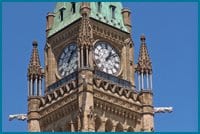A coalition of equality-seeking organizations, including queer lobby group Egale Canada, is up in arms over the federal government’s recent decision to reinstate funding for just part of what had been the Court Challenges Program — a decision that leaves queers and other minorities out in the cold.
“The Court Challenges Program was a very integral part [of gaining rights for sexual minorities], a significant tool for us,” says Helen Kennedy, executive director of Egale. “All of the cases that we brought to the Supreme Court of Canada received assistance from the program.”
Established in 1978 the Court Challenges Program of Canada was originally created to deal with language rights abuses. Over time its mandate was expanded to include other minority rights and it developed into a national nonprofit organization that provided legal funding to challenge laws on the grounds that they were discriminatory. The program provided funding for several landmark queer-focused court cases, including the case that won spousal benefits, pensions and tax breaks for same-sex couples in 1999 and the case that led to an expansion of the definition of marriage to include same-sex couples in 2003. The program, which had an annual budget of approximately $3 million, was scrapped by the Conservatives in 2006, ostensibly as a cost-cutting measure.
A reinstated version of the program, reborn as the Program to Support Linguistic Rights, was announced on Jun 20 with a budget of $1.5 million a year. The reinstatement was announced just weeks after the feds reached an out-of-court settlement with the Federation de Communautes Francophone et Acadienne du Canada.
Kennedy says that while she is happy that funding will be restored to the language rights side of the program she’s disappointed the same won’t be true for those seeking equality rights.
“Basically what the government is doing now is a divide and conquer,” she says. “They’re ranking minorities. How do your place precedence of one group over another?
“This is really a problem and I think that we’ve seen a slow, subtle erosion of LGBT rights since the Tories came to power. This is a very subtle way of denying us access to the justice system.”
Kennedy’s sentiment is echoed by other coalition members.
“I think that everyone involved with the coalition is happy that the minority language rights are being reinstated,” says Shelagh Day of the Canadian Feminist Alliance for International Action. “However we’re very distressed that at the same time the Harper government is continuing to deny equality rights. I feel this is a very good piece of evidence of something that we already know, that the Harper government is very hostile toward equality claims.”
The Court Challenges Program allowed individuals or organizations that could not afford the costs of going to court to apply for financial assistance. In order to be approved the applicant’s case had to challenge a current federal government law or test equality rights guaranteed in Section 15 of the Charter of Rights and Freedoms.
While in operation the program funded cases dealing with sexual discrimination, accessibility rights for those with disabilities, aboriginals voting rights, discrimination against visible minorities in the immigration system and discrimination against those of certain cultural backgrounds, especially in the wake of the events of Sep 11, 2001.
“In the Canadian Arab community we did use the Court Challenges Program to interact with the government on the issue of the security certificate and the Anti-Terrorism Legislation,” says Mohamed Boudjenane, executive director of the Canadian Arab Federation. “We felt these measures were targeting our communities and creating an ambiance where there was a lot of racial profiling. So it’s a valid tool for communities like ours to be able to engage in a public debate with the government and question some of their legislation.”
Kennedy says she’s hopeful that pressure on the federal government will cause it to revisit the decision. “We’re forming some plans to meet with the minister [of heritage, Josée Verner] and take this to the next step,” says Kennedy. “I think that this is a very significant group that has come together to form this coalition and we’re going to continue to work together for equality to access the justice system.
“There’s been all kinds of discussion within the coalition as to what we are going to do, but there haven’t been any decisions as of yet.”
“We really haven’t got to the point of discussing litigation as an option,” says Martha Jackman of the National Association of Women and the Law, also part of the coalition. “The initial effort has been to reengage a lobbying and political pressure campaign on this and not to resort to litigation, the reason being that launching charter test litigation of this type is quite challenging in terms of funding and also legal resources required.”
Jackman says that even with pro bono legal assistance the case would be too much of a financial burden for many of the groups in the coalition.
“I think that the equality-seeking community hopes that the Harper government will see the error of its way, or have a change in government. All the opposition parties have unanimously agreed that cutting the program was a mistake and that it should be reinstated and the only party that continues to challenge the equality dimension of the program is the Harper Conservatives. So I think that most of the coalition members are focusing on a political lobbying campaign at this point in time.”

 Why you can trust Xtra
Why you can trust Xtra


